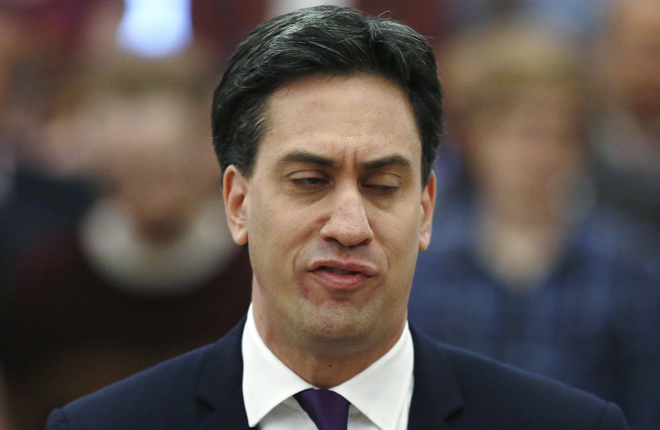The forthcoming general elections will be testing for the British Labour party and its leader, Ed Miliband. People are eager to see change happening and some of the promises made by the party have been well received by the public.

However, the party is still struggling to face the accusation of having betrayed its left-wing identity. One of the party’s major difficulties is caused by the unpopularity of its leader. Miliband has a history of terrible personal ratings and while a recent poll showed that 41% of voters believe Labour is most likely to form the government, only 21% believe Miliband will be prime minister.
It could be a matter of image: the Labour party’s leader has been quite unlucky when it comes to photographs (the list of pernicious pictures sees Miliband eating a bacon sandwich, looking awkward while giving money to a beggar, and looking like Wallace, the character of a cartoon). Moreover, Miliband does not live up to the standards established by Tony Blair’s public performance skills and has even publicly admitted that he is not the “politician from central casting”. He also added that there is more to politics than great pictures presenting himself as a politician whose strength lies in his values.
Presumably most people would agree on this point. Perhaps then the problem is a different one. No one can accuse Miliband of not having tried to communicate with the masses. For instance, he has made great efforts to appeal to young voters. Apart from creating an Instagram account, as part of his campaign he pledged to put as many young people into apprenticeship by 2025 as there are going to university, to lower the legal voting age to 16, and to double the number of people getting on the property ladder by pledging to build more homes and double the number of first-time buyers. Yet, despite Miliband’s attempt to “speak to the people”, he has not fully succeeded in convincing them that he is a confident leader who will be capable of taking tough decisions and that the Labour party can be trusted to manage the economy, and this is what his unpopularity is mostly due to.
And here is where the identity issue shows its importance. Left-wing voters have long claimed that the Labour party is not a real left party anymore and it seems that the values professed by Miliband are losing their meaning. In the past few months disillusioned voters have protested that Miliband has not promised strong enough measures to benefit the poorer half of the country. For instance, while the pledge to raise minimum wage to £8 by 2020 was widely welcomed, many criticised Miliband for not committing the party to introducing living wages. While Miliband has promised to allocate a greater budget to premium railways, many protest that poor people are more in need of better roads, motorways, and public transport. Regarding the promise about the apprenticeships, many criticised the party for not having a serious plan for tackling unpaid internships. At the moment one of the real strengths of Miliband’s campaign is the focus he placed on the National Health Service, one of the key issues that will guide voters’ decisions.
In the end voters will probably agree that there is more to politics than pictures, but Miliband and the Labour party need to show a greater determination to live up to the values they claim to have.
The forthcoming general elections will be testing for the British Labour party and its leader, Ed Miliband. People are eager to see change happening and some of the promises made by the party have been well received by the public.




